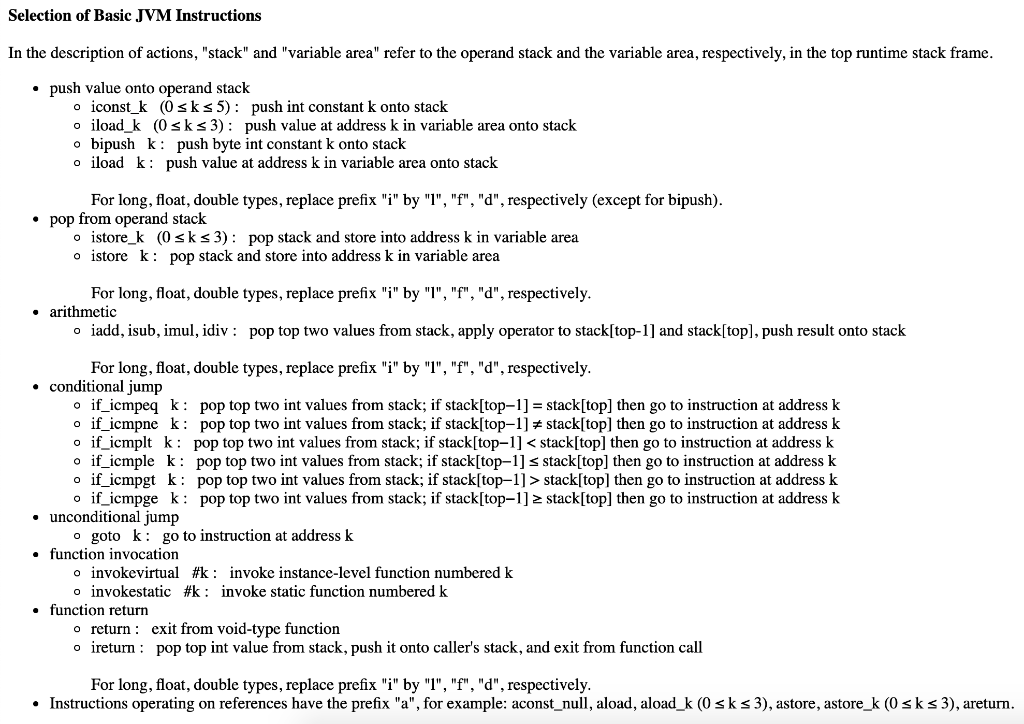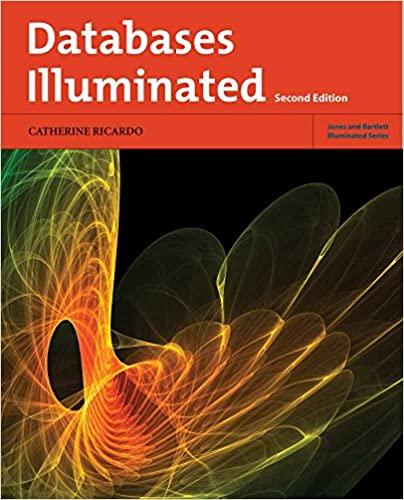

Selection of Basic JVM Instructions In the description of actions, "stack" and "variable area" refer to the operand stack and the variable area, respectively, in the top runtime stack frame. push value onto operand stack o iconst_k (Osk s5): push int constant k onto stack o iload_k (Osks 3): push value at address k in variable area onto stack obipush k: push byte int constant k onto stack o iload k: push value at address k in variable area onto stack For long, float, double types, replace prefix "i" by "1", "f", "d", respectively (except for bipush). pop from operand stack o istore_k (0 sk s 3): pop stack and store into address k in variable area o istore k: pop stack and store into address k in variable area For long, float, double types, replace prefix "i" by "1", "f", "d", respectively. arithmetic o iadd, isub, imul, idiv: pop top two values from stack, apply operator to stack[top-1) and stack[top], push result onto stack For long, float, double types, replace prefix "i" by "1", "f", "d", respectively. conditional jump o if_icmpeq k: pop top two int values from stack; if stack[top-1] = stack[top] then go to instruction at address k o if_icmpne k: pop top two int values from stack; if stack[top-1] # stack[top] then go to instruction at address k o if_icmplt k: pop top two int values from stack; if stack[top-1] stack[top] then go to instruction at address k o if_icmpge k: pop top two int values from stack; if stack[top-1] 2 stack[top] then go to instruction at address k unconditional jump o goto k: go to instruction at address k function invocation o invokevirtual #k: invoke instance-level function numbered k o invokestatic #k: invoke static function numbered k function return o return : exit from void-type function o ireturn : pop top int value from stack, push it onto caller's stack, and exit from function call For long, float, double types, replace prefix "i" by "1", "f", "d", respectively. Instructions operating on references have the prefix "a", for example: aconst_null, aload, aload_k (0 sks 3), astore, astore_k (0 sks 3), areturn. Consider the stack-machine instructions ("push y" through "pop to x") to compute the assignment x = y + (z*y)*z in this course note. Translate these instructions into JVM instructions. Presume that x, y, z are integer variables respectively stored at virtual addresses 0, 1, 2 in the variable area. Use instructions listed in the Selection of Basic JVM Instructions in this course note. Selection of Basic JVM Instructions In the description of actions, "stack" and "variable area" refer to the operand stack and the variable area, respectively, in the top runtime stack frame. push value onto operand stack o iconst_k (Osk s5): push int constant k onto stack o iload_k (Osks 3): push value at address k in variable area onto stack obipush k: push byte int constant k onto stack o iload k: push value at address k in variable area onto stack For long, float, double types, replace prefix "i" by "1", "f", "d", respectively (except for bipush). pop from operand stack o istore_k (0 sk s 3): pop stack and store into address k in variable area o istore k: pop stack and store into address k in variable area For long, float, double types, replace prefix "i" by "1", "f", "d", respectively. arithmetic o iadd, isub, imul, idiv: pop top two values from stack, apply operator to stack[top-1) and stack[top], push result onto stack For long, float, double types, replace prefix "i" by "1", "f", "d", respectively. conditional jump o if_icmpeq k: pop top two int values from stack; if stack[top-1] = stack[top] then go to instruction at address k o if_icmpne k: pop top two int values from stack; if stack[top-1] # stack[top] then go to instruction at address k o if_icmplt k: pop top two int values from stack; if stack[top-1] stack[top] then go to instruction at address k o if_icmpge k: pop top two int values from stack; if stack[top-1] 2 stack[top] then go to instruction at address k unconditional jump o goto k: go to instruction at address k function invocation o invokevirtual #k: invoke instance-level function numbered k o invokestatic #k: invoke static function numbered k function return o return : exit from void-type function o ireturn : pop top int value from stack, push it onto caller's stack, and exit from function call For long, float, double types, replace prefix "i" by "1", "f", "d", respectively. Instructions operating on references have the prefix "a", for example: aconst_null, aload, aload_k (0 sks 3), astore, astore_k (0 sks 3), areturn. Consider the stack-machine instructions ("push y" through "pop to x") to compute the assignment x = y + (z*y)*z in this course note. Translate these instructions into JVM instructions. Presume that x, y, z are integer variables respectively stored at virtual addresses 0, 1, 2 in the variable area. Use instructions listed in the Selection of Basic JVM Instructions in this course








